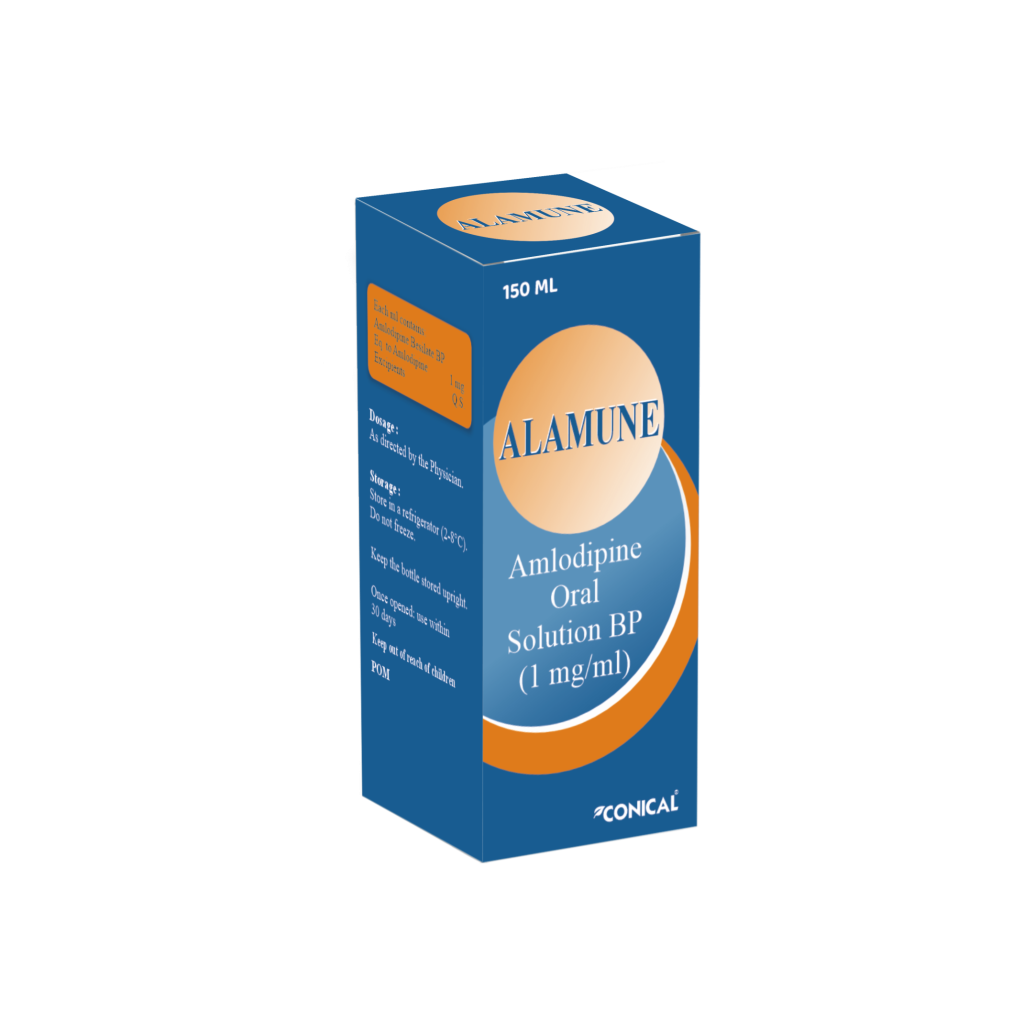Amlodipine Oral Solution (1 mg/ml)
- Amlodipine Oral Solution BP (1 mg/ml)
Therapeutic Class: Cardiovascular Agents
Dosage Forms: Liquids
Brand Name: Alamune™

How it works?
Uses of Amlodipine Oral Solution (1 mg/ml)
What are the uses of Amlodipine Oral Solution (1 mg/ml)
– Hypertension
– Chronic stable angina pectoris.
– Vasospastic (Prinzmetal’s) angina.
Amlodipine Oral Solution (1 mg/ml)
Mainly used for hypertension
– Amlodipine is used to relax blood vessels & reduce the workload on the heart by allowing blood to flow more easily.
– Beneficial to lower blood pressure and reduce the risk of stroke, heart attack & kidney problems.
– It improves blood flow to the heart muscle and also reduces chest pain during physical activity or stress.
Precautions of Amlodipine Oral Solution (1 mg/ml)
The safety and efficacy of Amlodipine Oral Solution (1 mg/ml) in hypertensive crisis have not been established.
Patients with cardiac failure: Patients with heart failure should be treated with caution. In a long-term, placebo-controlled study in patients with severe heart failure (NYHA class III and IV), the reported incidence of pulmonary edema was higher in the amlodipine-treated group than in the placebo group.
Calcium channel blockers, including amlodipine, should be used with caution in patients with congestive heart failure, as they may increase the risk of future cardiovascular events and mortality. Use in patients with impaired hepatic function: The half-life of amlodipine is prolonged, and AUC values are higher in patients with impaired liver function; dosage recommendations have not been established. Amlodipine should therefore be initiated at the lower end of the dosing range, and caution should be used both on initial treatment and when increasing the dose. Slow dose titration and careful monitoring may be required in patients with severe hepatic impairment.
Use in elderly patients: In the elderly, an increase of the dosage should take place with care
Use in renal failure: Amlodipine may be used in such patients at normal doses. Changes in amlodipine plasma concentrations are not correlated with degree of renal impairment. Amlodipine is not dialyzable.
Dosages administration of Amlodipine Oral Solution (1 mg/ml)
For oral administration.
Amlodipine Oral Solution (1 mg/ml) should not be mixed with food or beverages before use.
Adults:
For both hypertension and angina, the usual initial dose is 5 mg (5 ml) of amlodipine once daily, which may be increased to a maximum dose of 10 mg (10 ml) depending on the individual patient’s response.
In hypertensive patients, amlodipine has been used in combination with a thiazide diuretic, alpha blocker, beta blocker, or an angiotensin-converting enzyme inhibitor. For angina, amlodipine may be used as monotherapy or in combination with other antianginal medicinal products in patients with angina that is refractory to nitrates and/or to adequate doses of beta blockers.
No dose adjustment of amlodipine is required upon concomitant administration of thiazide diuretics, beta blockers, and angiotensin-converting enzyme inhibitors.
Elderly: Amlodipine used at similar doses in elderly or younger patients is equally well tolerated. Normal dosage regimens are recommended for the elderly, but increasing the dosage should take place with care.
Side effects of Amlodipine Oral Solution (1 mg/ml)
The most commonly reported adverse reactions during treatment are somnolence, dizziness, headache, palpitations, flushing, abdominal pain, nausea, ankle swelling, edema, and fatigue. Palpitations, Uncommon: Arrhythmia (including bradycardia, ventricular tachycardia, and atrial). Ankle swelling, muscle cramps, Uncommon: Arthralgia, myalgia back pain
Storage instruction of Amlodipine Oral Solution (1 mg/ml)
Store in a refrigerator (2-8°C). Do not freeze.
Keep the bottle stored upright.
Keep out of reach of children.
Packing details of Amlodipine Oral Solution (1 mg/ml)
Amlodipine Oral Solution BP (1 mg/ml) is available as 150 ml in an amber PET bottle. Such 01 bottle in a unit carton with package insert.
interested? let’s talk.
Contact us directly to receive full information on the product, the formulation, the science behind it, stability data, and more. Our Business Development Manager is a click away.
Frequently Asked Questions
Questions are useful tools, they open lines of communication; give us information; improve interactions, facilitate analysis, and many more.
-
It is a high‑demand cardiovascular product, ensuring consistent turnover in hospital and retail markets.
-
We provide bottles in multiple sizes (60 ml, 100 ml, 200 ml), with private‑label customization available for branding and compliance labeling.
-
The MOQ for this oral solution is always between 100,000 and 200,000 units per shipment, depending on packaging format and regional requirements.
-
This product is export‑ready across countries, with strong demand in cardiology, hospital, and consumer wellness markets worldwide.
-
It is especially beneficial for children, elderly individuals, and patients requiring flexible dosing.
-
Yes, but it should be taken under medical guidance, especially if combined with other cardiovascular therapies
